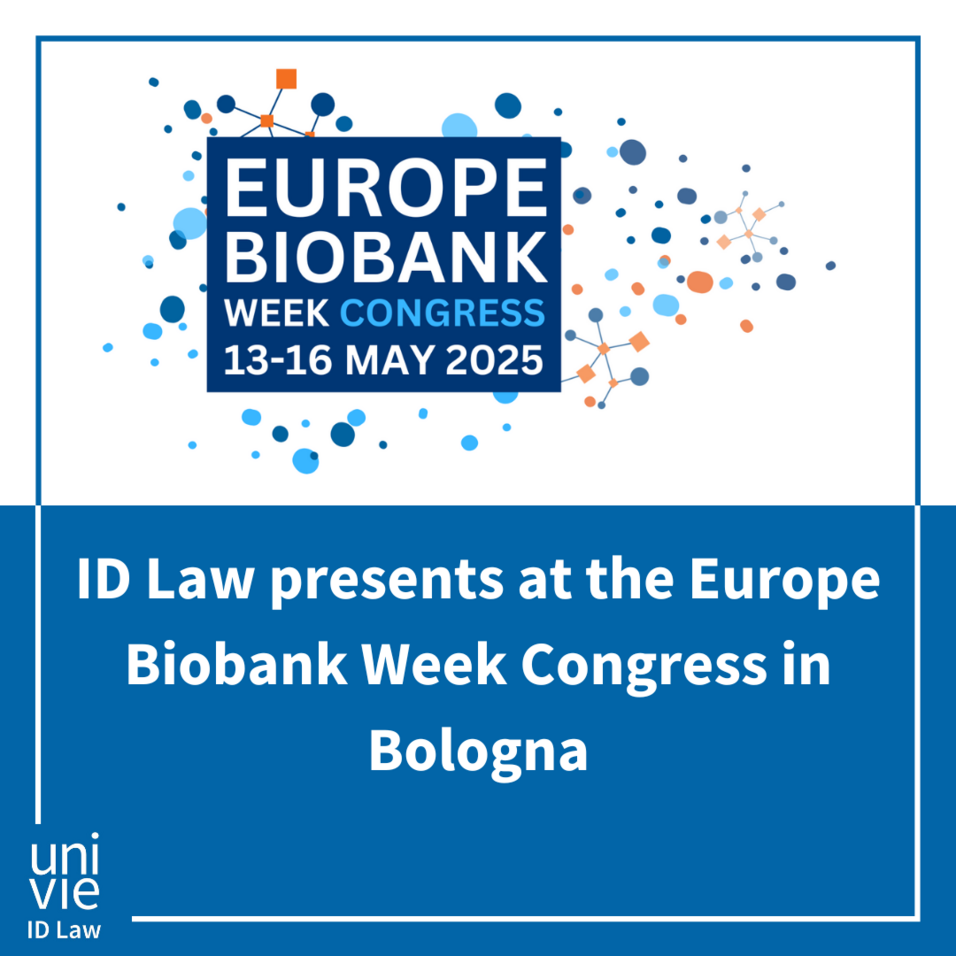The Europe Biobank Week 2025 (EBW) was held at the Palazzo dei Congressi in Bologna, Italy, from the 13th to the 16th of May 2025. The participation of the Department of Innovation and Digitalisation in Law is integrated within UNIVIE’s role as partner in BBMRI.at. The team covers legal and regulatory challenges and opportunities and has strived – along with other BBMRI.at partners – to bring attention to the research potential and challenges faced by biobanks in Austria and Europe.
Apart from being part of the keen audience of important key notes and workshops, ID Law Team member Catarina Almeida co-presented a poster on the topic of Sustainability in Biobanking: Legal Framework and Practical Implementation. The abstract and poster were developed by UNIVIE alongside the team of BBMRI.at partner Biobank Graz of Medical University of Graz, whose work on biobank sustainability is internationally recognized. The poster focuses on the environmental dimension of biobank sustainability, presenting selected international, European Union and Austrian national legal instruments and certifications that can influence biobanks’ operations. Whilst compliance with all of these instruments is generally not compulsory at this stage, the premise of the poster is that biobanks, as key actors of contemporary scientific advancements, should lead by example in adopting measures for environmental protection. The poster also highlights the legal potential of endorsing regulatory measures that further mitigate the environmental impact of biobanking, such as adopting consent models that favour sample reuse, to reduce the strain on biobanks that are required to keep samples for indefinite periods of time, despite not always being allowed to make use of them.
On the theme of the EBW, the UNIVIE BBMRI.at team had some thoughts to share:
What do we do?
The Austrian National Node of BBMRI-ERIC – which is currently on its third working period (2023-2028) – has included, in this current work programme, a Work Package (WP) dedicated to exploring the legal backdrop for biobank research and covered by the Department of Innovation and Digitalisation in Law of the University of Vienna (UNIVIE). Within this WP, the UNIVIE Team manages an internal legal helpdesk addressing the BBMRI.at consortium’s questions as well as BBMRI-ERIC ELSI Helpdesk enquires, namely on data protection, data security, intellectual property rights and biodatabase law. The answers provided by UNIVIE are gradually being consolidated in the BBMRI.at webpage ‘Legal Issues’, which is a Legal Knowledge Base (a ‘biobank’ of legal information about biobanks!), accessible to a broader audience of researchers. This is done through the invaluable help from Cornelia Stumptner, executive manager of BBMRI.at, from Medical University of Graz, the coordinator of BBMRI.at, and leader of the WP “Coordination of the National Network & National Node Operation”. UNIVIE’s legal “Q&A”s are also shared in BBMRI.at news articles and the BBMRI-ERIC newsletters.
Why is our topic important?
Operating a biobank and conducting scientific research resorting to data and samples stored in biobanks incorporates challenges regarding compliance with legislation both at the Austrian and European Union (EU) levels. Every month, UNIVIE’s legal helpdesk issues answers contending with the existing legal framework that biobanks must operate within. Different research projects may require stakeholders to familiarise themselves with distinct legal acts. Within BBMRI.at, biobank research is conducted with human samples as well as veterinary samples (through fellow BBMRI.at Partner, the University of Veterinary Medicine). This means that the breadth of legislation covered by UNIVIE is indeed very wide and – due to the new and upcoming legislative efforts at EU level – rapidly broadening.
Which innovations are going on in this field?
Part of the work conducted by UNIVIE precisely includes monitoring legal and regulatory developments and providing input to current legal discussions. UNIVIE expects that recent the Data Governance Act (DGA), the Data Act, the Artificial Intelligence Act and the European Health Data Space (EHDS) Regulation, are due to impact, to different extents, biobanking activities. Keeping Project partners and Austrian biobanks up to date on these matters – and offering insightful analyses of these legal acts – has been a priority for UNIVIE. Two internal workshops (one of which included a webinar which has been made available online) as well as a science-to-public conference on the New era for health data: Secondary use of data in the EHDS and DGA and its implementation in Europe and Austria have been offered to stakeholders. More formative and dissemination activities are due to be organised in the next months!
Why is the EBW interesting for us?
The EBW provides an opportunity to interact with biobank stakeholders from the European Union and abroad. As legal experts, the UNIVIE Team greatly appreciates having a forum to discuss the challenges faced by the scientific community and bridge the gap between desk and lab! Both this and the previous iteration of the EBW facilitated this multidisciplinary interaction and helped build a closer collaboration with the BBMRI-ERIC ELSI Team, ELSI experts from the different national nodes and created a solid foundation to foster a continued cooperation to advance and support biobank research.
Funding Information:
This work was supported by the Austrian Federal Ministry of Women, Science and Research funded project BBMRI.at [grant number 2023-0.752.780].

